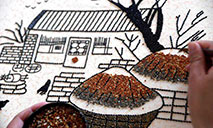Le Point magazine: media outlet or tool to smear China?
In February, Jeremy Andre Flores from the French magazine Le Point published an article vilifying Christian Mestre, a professor from the University of Strasbourg who had praised China's counter-terrorism and de-radicalization measures in Xinjiang, calling him a “henchman” of China.
The report, published amid rising anti-China sentiment instigated by Western media, together with pressure from a group of anti-China teachers and sinologists at the University of Strasbourg, resulted in the professor being forced to step down from his post as the ethics officer of the Strasbourg Eurometropolis in March.

Children have fun on Dove Lane in Hotan City, northwest China's Xinjiang Uygur Autonomous Region, May 27, 2020. (Xinhua/Sadat)
A supporter of Christian Mestre said on Twitter that he had resigned so as to stay away from “despicable people”, and expressed shock that the professor, who had taught in various universities in Europe, had been described as a “chess piece” of China by Le Point.
Jeremy Andre Flores said on Twitter that his investigations into Christian Mestre were impeccable. In fact, the “investigations” mentioned by the French journalist, who currently lives in Hong Kong and has never been to Xinjiang, were nothing but the digging out of remarks the professor had made two years ago and fabrication of a story of a dubious relationship between him and China.
Le Point represents the opinion of mainstream media in France. Its report not only resulted in Christian Mestre being forced to resign from his post, but also served as a threat to those who are friendly towards China in France.
Some anti-China sinologists in European countries such as Belgium, have also voiced extreme opinions against China, making it hard not to relate them with Western intelligence agencies.
Why did this incident happen in France, a country that worships equality and freedom? Looking deeper, one realizes that the incident was not just about French media distorting facts about China, but is also a reflection of a pro-U.S. attitude adopted by French media. In other words, their opinions on issues related to China’s Xinjiang are always like those held by the U.S.
French media widely accept ideas such as "concentration camp" and "genocide", both of which are fraudulent claims made by the U.S.-based German far-right ideologue Adrian Zenz.
However, researchers, institutions, media figures, and internet users from many countries across the world have refuted Zenz’s lies about Xinjiang on social media platforms through facts and evidence.
A number of enterprises and individuals in the Xinjiang Uygur Autonomous Region have directed lawyers to sue Zenz for spreading "forced labor" and other rumors related to Xinjiang, which have damaged their reputation and caused them to suffer economic losses.
They have also filed a civil lawsuit with a local court in Xinjiang, demanding that Zenz apologize, restore their reputation and compensate them for their losses.
In the book The End of Uyghur Fake News, French author Maxime Vivas gave an example of how Western media had smeared Xinjiang by using false facts.
In a documentary about a Uygur doctor named Enver Tohti broadcast by Arte TV, a German-French TV channel, the doctor told a story in the U.S. of how he had been involved in organ harvesting, and admitted that he was a criminal. However, he was not issued an international arrest warrant, because everyone knew he made it up. The documentary has been taken off air.
It seems that some French media, while producing false reports on Xinjiang, have forgotten the Charter of Munich, or the Munich Declaration of the Duties and Rights of Journalists, as well as the professional dignity the Charter calls on journalists to observe.
Photos
Related Stories
- Chinese envoy warns EU against sanctions over Xinjiang
- NW China's Xinjiang creates economic benefits from its sound ecological environment
- Commentary: No more crocodile tears for China's Xinjiang
- Companies, individuals in Xinjiang to sue rumormongering Adrian Zenz for causing reputation damage, economic losses
- Departed hero deputy missed at NPC session, but spirit lives on
- Pic story of folk dancer in Xinjiang
- Claiming 'genocide' in Xinjiang pure political manipulation: Wang Yi
- "Xinjiang genocide" claim a thorough lie: Chinese FM
- Xinjiang girls seeking a better living and life of dignity is now BBC's 'evidence of coercion'
- Not one word of truth in Western media’s anti-China reports on Xinjiang: French journalist
Copyright © 2021 People's Daily Online. All Rights Reserved.










